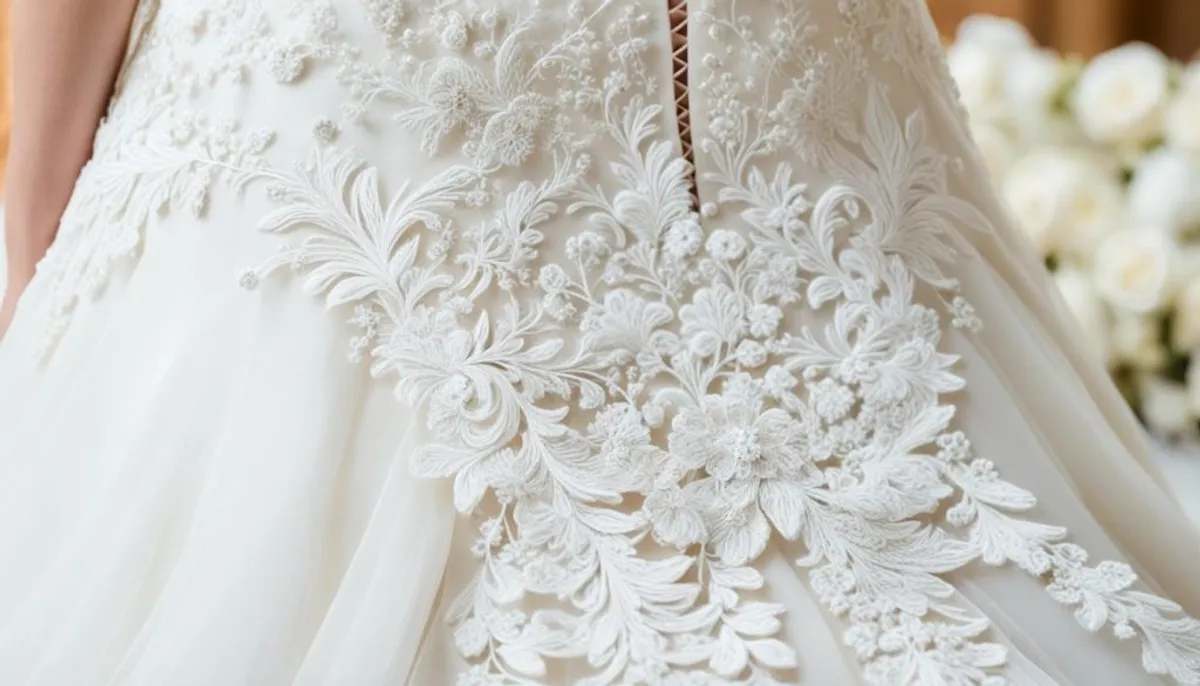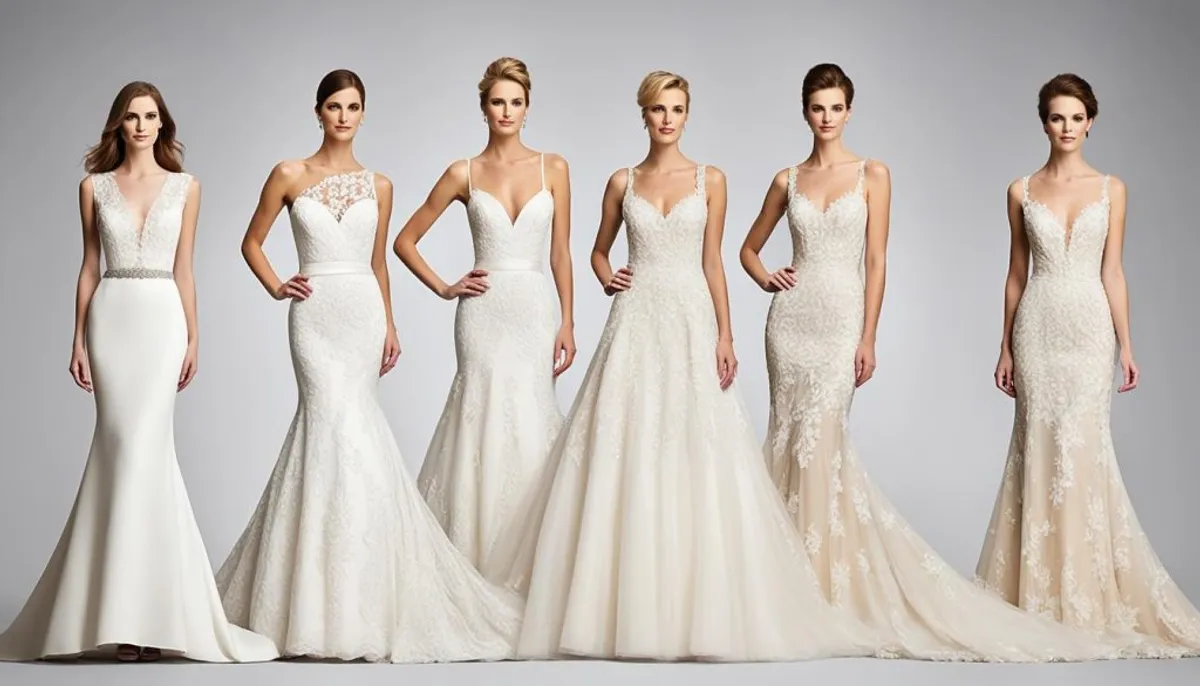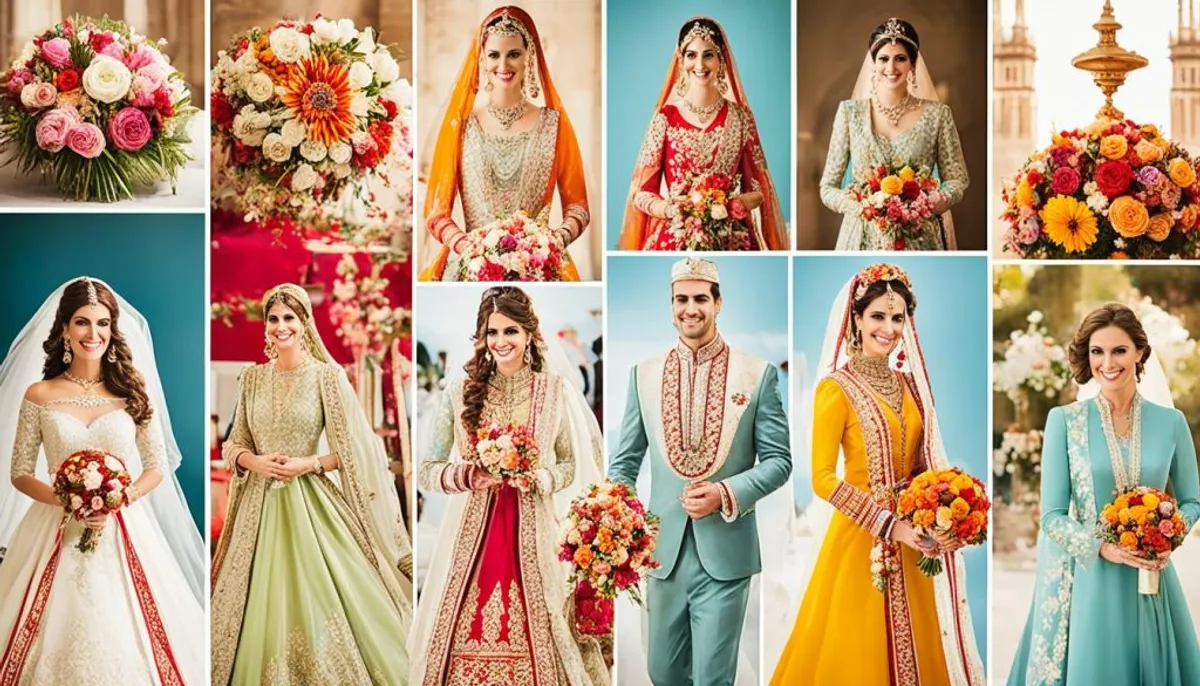The train on a wedding dress is more than just a design feature. It symbolizes grandeur, grace, and the timeless tradition of marriage. For centuries, the train has been a key part of wedding fashion, from royal gowns to modern fairytale looks. This flowing part of the dress adds elegance and a touch of royalty to the bride’s outfit.

The train’s history in bridal fashion is deep and rich. It reflects the cultural importance of marriage. Knowing its origins and evolution helps us understand why the train is so crucial to the wedding dress and the big day itself.
The Regal History of Wedding Dress Trains
The history of the wedding dress train goes way back to medieval times. Back then, the length of a bride’s train showed her social status and wealth. The longer the train, the higher her social rank. This was a sign of luxury, only for the wealthy.
Origins and Significance of Trains in Medieval Times
In medieval times, wedding gown styles and marriage traditions were all about luxury, thanks to royal bridal fashion evolution. Noble brides wore dresses with long trains to show off their family’s wealth. The cultural wedding customs of the time made the train’s length very important. Longer trains meant a higher social status for the bride.
| Era | Train Length | Significance |
|---|---|---|
| Medieval | Longer trains | Indicator of high social status and wealth |
| Modern | Varied train lengths | Symbolic of a bride’s personal style and preference |
The royal wedding influence on wedding gown styles and marriage traditions has lasted for centuries. Today, the wedding train is still a key part of the bridal look. It lets brides make a big statement on their big day.
The Dramatic and Elegant Appeal
Wedding dress trains bring drama and elegance to a bride’s look. They make her feel like a princess or like she’s in a fairytale. This desire for grandeur comes from the wedding dress design and bridal attire history.
The train adds movement and depth to wedding gown styles. It makes the bride look graceful and elegant. Photographers love capturing this elegance, making the bride’s entrance unforgettable.
Whether it’s a sweeping cathedral train or a smaller one, the dress’s train changes the look of the event. It lifts the bride’s presence, making the day unforgettable.
| Train Length | Description | Visual Impact |
|---|---|---|
| Sweep | Extends just beyond the bride’s feet, creating a gentle, flowing silhouette. | Elegant and graceful, with a subtle, romantic appeal. |
| Cathedral | Extends several feet beyond the bride’s feet, creating a dramatic, regal appearance. | Commanding and majestic, with a sense of grandeur and opulence. |
| Royal | Extends several yards beyond the bride’s feet, creating a truly spectacular and awe-inspiring presence. | Breathtaking and awe-inspiring, with a timeless, fairy-tale quality. |
Why Do Wedding Dresses Have Trains
The design of wedding dresses with trains has a long, regal history. For centuries, trains have symbolized wealth, status, and elegance. Today, they still add a touch of tradition and magic to the bride’s look.
Wedding dresses with trains come from royal and aristocratic traditions. In medieval times, long trains showed off wealth and high social status. The longer the train, the higher the social rank.
Now, the train is still a key part of wedding dresses. It adds drama and elegance during the ceremony and first dance. It makes the bride look grand and magical.
The train shows how much wedding dress design and marriage traditions matter today. It’s a sign of the lasting beauty of bridal attire history.
Long or short, the train makes the bride look stunning and timeless. It brings out romance and sophistication. This design element has lasted through the ages, showing how wedding gown styles and why do wedding dresses have trains are key to marriage traditions. Additionally, the engagement ring symbolism plays a vital role in the overall narrative of love and commitment.
Choosing the Right Train Length
Choosing the right train length is key in wedding dress design. Wedding dresses have different train lengths, from the short sweep to the long royal train. The train length should match the dress’s style, the bride’s height, and the wedding’s formality.
From Sweep to Cathedral to Royal Trains
Sweep trains are short and perfect for casual or outdoor weddings. They add elegance without being too much. Cathedral trains are longer and more formal, great for big venues and formal weddings. Royal trains are the longest, making a big statement and adding grandeur.
When picking a train length, think about how you’ll move with it. A too-long train can be hard to manage. A too-short train might not look as grand as you want.

The train’s length is important in wedding dress design. It reflects bridal attire history and marriage traditions from different cultures. The train’s length shows the wedding’s level of elegance and formality.
Modern Alternatives and Considerations
Traditional and formal wedding dress designs often have grand trains. But, modern bridal attire offers many trainless options for those who prefer it. Some brides choose wedding gown styles without a train for ease of movement or to match their marriage traditions. Additionally, the human rights implications interfaith marriage can influence these choices, as cultural backgrounds may dictate preferences for wedding attire.
For brides wanting a train’s drama, there are creative options. They can add an overskirt or a detachable train to their dress. This way, they can easily switch from a simple look to a more elaborate one. Or, a long cathedral or chapel-length veil can add elegance and grandeur.
Choosing to have a train or not is a personal choice. It depends on modern wedding trends, the bride’s style, and her vision for the day. Whether it’s a traditional train or a unique alternative, the goal is to pick a wedding dress design that tells their story and celebrates their love.
Cultural and Customary Influences
The designs and trains of wedding gowns have a long history. They go beyond just fashion. In many cultures, the train’s length shows the bride’s social status. It’s like a visual clue of her place in society.
Now, choosing a train for the wedding dress is more about personal taste. It’s not just about following cultural rules. Brides pick the train length that fits their style and the day’s look.
Wedding Dress Trains Across Cultures and Traditions
Wedding traditions and fashion changes have led to many train styles for wedding dresses. Some like big, sweeping trains for grandeur. Others prefer simple designs to show off the bride’s elegance.
- In India, the bride’s lehenga has a long, fancy train. It shows the ceremony’s importance and beauty.
- In some Middle Eastern countries, the bride wears a big veil that turns into a dramatic train. This shows respect for modesty and tradition.
- In Western Europe, the train’s length used to show the bride’s high social rank. Royal brides wore long, fancy trains to show off their status.
The train’s role in wedding fashion is still exciting. It’s part of what makes wedding traditions so special.

Capturing the Magic in Photography
Wedding dress design has always caught photographers’ eyes. Its rich bridal attire history and beautiful marriage traditions make it a favorite subject. The wedding gown styles, especially those with dramatic trains, are perfect for stunning photos. These photos show off the bride’s elegance and grace.
The train of a wedding dress is a photographer’s dream. It adds depth, movement, and dimension to photos. Skilled photographers use the train to capture amazing moments during the ceremony and reception.
| Photography Technique | Impact on Wedding Photography |
|---|---|
| Dramatic Poses | The train can be used to create sweeping, regal poses that showcase the bride’s stature and command attention. |
| Artistic Compositions | The movement and flow of the train can be leveraged to frame the bride, leading the eye through the image and creating a sense of elegance and sophistication. |
| Capturing Emotional Moments | The train can be used to highlight the bride’s emotional reactions, such as the moment she walks down the aisle or the first dance with her partner. |
Wedding photographers use the train to make their photos stunning and emotional. These photos capture the bride’s journey and the magic of the wedding day.
From cathedral-length trains to graceful sweep trains, the wedding dress and its train are key to memorable photos. Photographers who understand the photographic appeal of the train can make the bride’s day even more special.
Conclusion
The history of wedding dress trains is fascinating and has won over brides and wedding fans. They started in medieval times as a symbol of royalty. Now, they add elegance and drama to a bride’s look.
Choosing a wedding dress train is a big decision. It can be a long, sweeping train or something more simple. Each choice shows off the bride’s style and honors the long tradition of wedding dresses.
As we say goodbye to wedding dress trains, we value their beauty and meaning more. They show the skill, symbolism, and beauty of wedding dresses. They prove the lasting charm of wedding traditions in today’s world.
RelatedRelated articles



